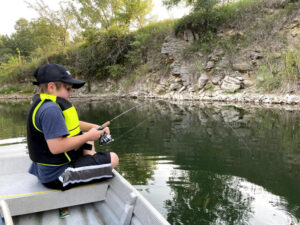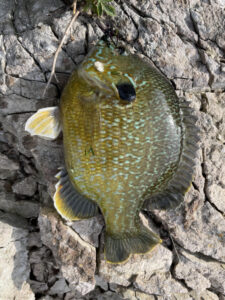The Guys Do the Work
Some aspects of sunfish sex are bizarre. Here is a huge family of many species of fish where the guys do the hard work caring for their babies. That’s unusual in the animal kingdom, where normally mom cares for the young.
There are many sunfish species. Most are native to the eastern United States but they’ve been stocked all over the world. Bluegills, pumpkinseeds green sunfish, and crappies are abundant, easy to catch, and tasty. That’s why they’re called “panfish.” Largemouth and smallmouth bass also belong to the Centrarchidae, or sunfish, family but most people consider them gamefish.
How It Works
As water warms in the spring, the males of most sunfish species create a round depression in the sand in shallow areas of a lake or pond. Females don’t help a bit with nest building and spend their days cruising the water seeking tasty invertebrates to eat. They visit a nest only to lay eggs, which are immediately fertilized by the tending male. She leaves. He stays. Lots of pesky small fish love eating sunfish eggs, so the poor male spends his days chasing them off. Finally, after the eggs hatch and babies leave the nest, he’s free to join the females roaming the pond.
Many sunfish species nest throughout the warm months, while others, like bass and crappies, have one spawning season. One part of sunfish sex is absolutely strange.
Unusual Area
A four-acre pond where Rich fishes has relatively deep water and only one shallow area suitable for sunfish to nest. It is small so round nests are crowded together, forcing the two sunfish species to spawn near each other.
Green Sunfish are smallish but aggressive colorful fish with relatively large mouths. They usually dwell in rocky areas. Bluegills are one of the largest of the sunfish. When both nest in close proximity hybrids result. They look a little different from each parent species. The strange part is that nearly all the hybrids are males!
Sunfish are amazingly common, fascinating, and often colorful. Males are fun to watch as they patrol their circular nests driving off intruders.
- Sunfish are fun to catch.
- Chunky hybrid sunfish.



